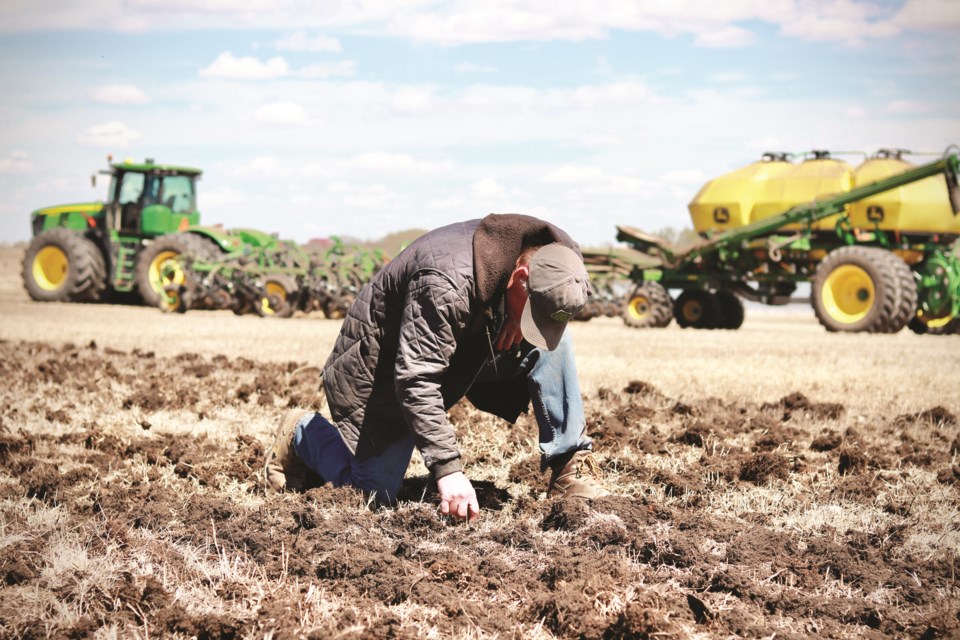As farmers and ranchers across Alberta are gearing up for another drought year in 2024, Paul Wiebe, a seed grower north of Beiseker, is determined to stay positive.
Alberta’s winter snowpack is well below average, many rivers are at record low levels and multiple reservoirs remain well below capacity, according to the Province. More than 70 per cent of the country is experiencing drought conditions.
Wiebe is in his sixth year of running a seed farm in the north-east corner of Rocky View County, growing pedigreed seed for other Alberta farmers.
“We grow wheat, barley, peas, durum, lentils – for seed production,” Wiebe said. “So we clean it and then sell it to farmers across Alberta.”
During the last two years, his yield production dropped to around 60 per cent of his usual yield.
Despite being on crop insurance level for two years, Wiebe noted that other areas of the province were hit much harder and he’s thankful for what he was able to produce.
“Obviously it affects your bottom line, you're not making as much money, but also thankful to have that safety net of crop insurance so that we can continue farming the next year,” he said.
Higher commodity prices in 2022 were beneficial to farmers despite a low yield, he explained. Meanwhile, crop insurance averages are dropping due to decreased crop production in recent years.
Wiebe noted that input costs have gone up dramatically as well, without much control over prices when their product goes to market.
“That's what makes grain farming challenging, I'd say, it's just being that price taker,” he said. “We pay what we have to for fertilizer, for chemical, for seed, there's really no negotiating anything along the way. Then when we sell our commodity we take a price that somebody else has set, whereas other businesses will offset their increased cost of production by marking up the value of their products. As farmers we are not able to do that.”
There are tools farmers can use, such as forward pricing within a contract, but some farmers may be hesitant to sign a contract as they’re unsure if they can produce an average crop.
Some farmers took on big contracts at high prices in the past, Wiebe said, but weren’t able to fulfill them due to drought or hail –subsequently they faced large penalties and contract buyouts.
“Residual moisture levels are very low, there are no reserves in the soil,” Wiebe said. “So we're heavily relying on some snow in March and a slow melt. And then obviously rain at some point – timely rain.”
Irrigation is common in the south of Alberta, but not in the area around Beiseker. Wiebe said even irrigation farmers in some areas have struggled due to low reservoir levels and water restrictions.
Going forward, Wiebe plans to adjust fertilizing and top up nutrients as rain falls.
“There's not a lot you can do, you still have to put the crop in and you still have to give it what it needs,” Wiebe said.
To avoid taking on debt, Wiebe plans to continue maintaining current equipment instead of upgrading to newer equipment.
Mental Health Challenges
With the financial stress on farmers increasing over the last couple of years, mental health awareness has also become more prevalent in rural communities.
Wiebe noted that farmers are dealing with large amounts of money and if the rain doesn’t come, the stress grows.
While he has noticed more outreach to farmers about mental health, he said sometimes it’s not reaching all the people that need to be reached.
There’s a big push about mental health awareness on social media, but farmers who aren’t on social media could be struggling to get help or support.
“That guy is very hard to reach,” Wiebe said. “I think at that point it takes family and friends to recognize the signs – recognize that your uncle isn't doing so good or you haven't seen your neighbour for coffee and should stop in. It's going to take that extra effort from everybody to reach out.”
Wiebe said he tries to stay optimistic and focus on enjoying the lifestyle of farming. He added it’s also about enjoying time with family in the off-season.
The nice thing about crop farming is that there’s a lot of different stages, he said.
“You fire up the [seed] drill and you get that smell of that fresh soil and once you're tired of seeding, it's over and you move on to spraying,” Wiebe said, adding that before he knows it he’s combining.
And while the hours get long, Wiebe said it doesn’t take long until he’s cleaning seed and hauling by semi to the elevator.



